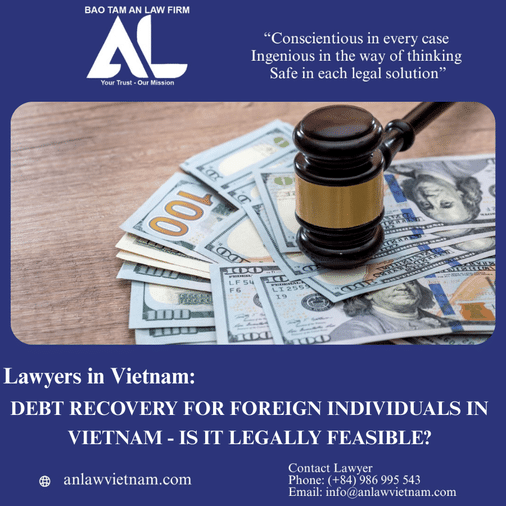Debt Recovery For Foreign Individuals In Vietnam – Is It Legally Feasible?
In recent years, Vietnam’s economy has experienced significant growth, attracting businesses and entrepreneurs from around the world to invest and operate in the country.
However, this economic expansion has also led to an increase in debt-related disputes, affecting both enterprises operating in Vietnam and foreign individuals working or residing in the country.
Over the past few years, An Law Vietnam has successfully assisted hundreds of foreign clients in recovering funds lent to Vietnamese individuals through various legal measures.
This article aims to provide foreign individuals with a comprehensive understanding of debt recovery under Vietnamese law, offering legal perspectives on lending transactions and outlining the debt collection process in Vietnam.

DEBT RECOVERY FOR FOREIGN INDIVIDUALS IN VIETNAM – IS IT LEGALLY FEASIBLE?
Legal Provisions
Under Vietnamese law, a civil relation involving foreign elements is established if it falls into one of the following categories:
- At least one party is a foreign individual or legal entity;
- All parties are Vietnamese citizens or legal entities, but the transaction is established, modified, performed, or terminated abroad;
- All parties are Vietnamese citizens or legal entities, but the object of the civil relation is located abroad.
- From these provisions, it is clear that civil relations between entirely foreign organizations or individuals are also considered civil relations involving foreign elements under Vietnamese law
Case Scenario: Assessing the Start of Debt Recovery
Loans often arise from close personal relationships between the debtor and creditor. In many instances, creditors trust the debtor to such an extent that funds are transferred based solely on text messages or verbal promises of repayment.
Problems occur when creditors discover that such assurances are false, and the borrowed funds appear to vanish along with the debtor.
Legal Consultation and Initial Measures
At An Law Vietnam, we understand these challenges and provide tailored strategies for each situation:
Debt recovery through negotiation: Verification of debtor’s information, place of residence, repayment capacity, and repayment schedule, followed by settlement discussions.
Debt recovery through litigation: Initiating legal proceedings to enforce overdue debt repayment obligations.
Depending on the case, our services may include the following:
- Advising on dispute resolution strategies.
- Representing and supporting clients in necessary legal procedures to protect their rights and interests.
- Collecting, examining, and evaluating evidence to strengthen the case.
- Drafting legal documents such as petitions, complaints, and official correspondence.
- Representing clients before courts or arbitration centers.
- Advising on effective enforcement of court judgments.
Filing a Lawsuit in Vietnamese Courts
Key documents required include:
- Petition for overdue debt repayment;
- Loan agreements or personal loan notes; text messages or written confirmations;
- Payment receipts, debt acknowledgment letters, or postponement agreements;
- Proof of debtor’s residence and workplace;
- ID card/passport of the claimant;
- Evidence proving the claim is within the statute of limitations;
- Translated and legalized documents (if issued abroad).
- All procedures must comply with the Vietnamese Civil Procedure Code regarding notifications and statutory deadlines.
Temporary measures to ensure debt repayment
Before or during litigation, creditors may request provisional measures such as:
- Freezing assets to prevent dissipation;
- Seizing movable or immovable assets under court supervision;
- Requesting banks or registries to provide debtor’s asset information.
- These measures are essential to ensure effective enforcement once a final judgment is issued.
Typical costs in cross-border debt collection
Debt recovery involving foreign elements often requires significant time and expense due to jurisdictional and language complexities.
Typical costs include:
- Court and arbitration fees;
- Translation and notarization costs;
- Legal representation fees in Vietnam;
- Enforcement agency expenses.
- Attorney fees for debt collection in Vietnam are not fixed and depend on multiple factors such as the value of the debt, available evidence, and complexity of the dispute. Larger claims or litigation typically require more resources, leading to higher costs.
Conclusion
With extensive experience in litigation and debt recovery for foreign clients, An Law Vietnam is committed to maintaining confidentiality and providing effective legal strategies.
Hiring An Law Vietnam’s lawyers to initiate debt recovery litigation can be an effective legal solution at any stage of the debt recovery process. Our lawyers act as trusted advisors, representatives, and advocates throughout the entire process before Vietnamese courts and arbitral tribunals.
In Vietnam’s dynamic legal and economic environment, having An Law Vietnam by your side can be a wise and strategic choice in debt recovery matters.
Contact An Law Vietnam
📞 Phone: (+84) 986 995 543
📧 Email: info@anlawvietnam.com
📍 Head Office: Diamond Plaza, 34 Le Duan Street, Sai Gon Ward, Ho Chi Minh City
🏢 Vung Tau Branch: Vo Thi Sau Street, Vung Tau Ward, Ho Chi Minh City
